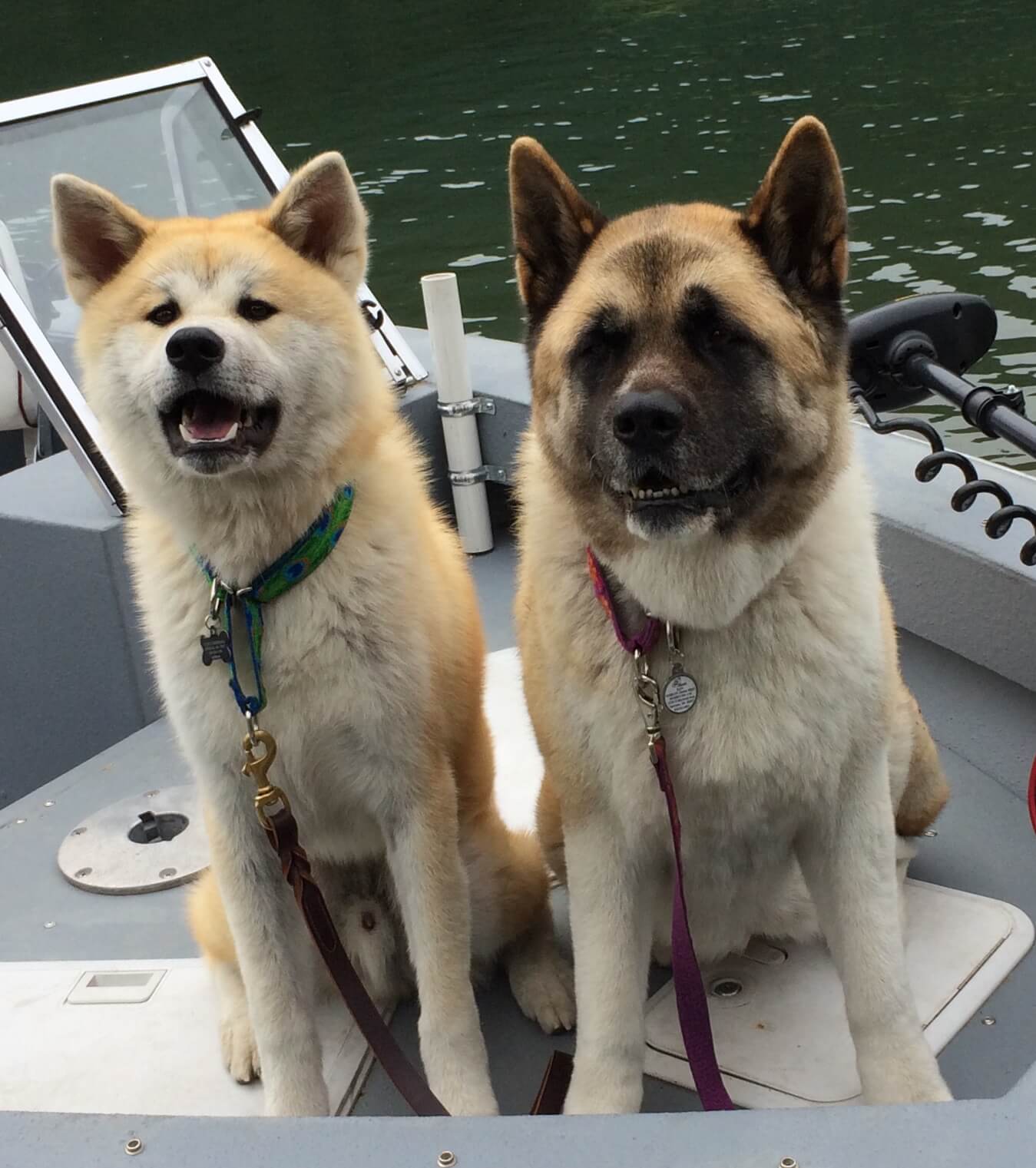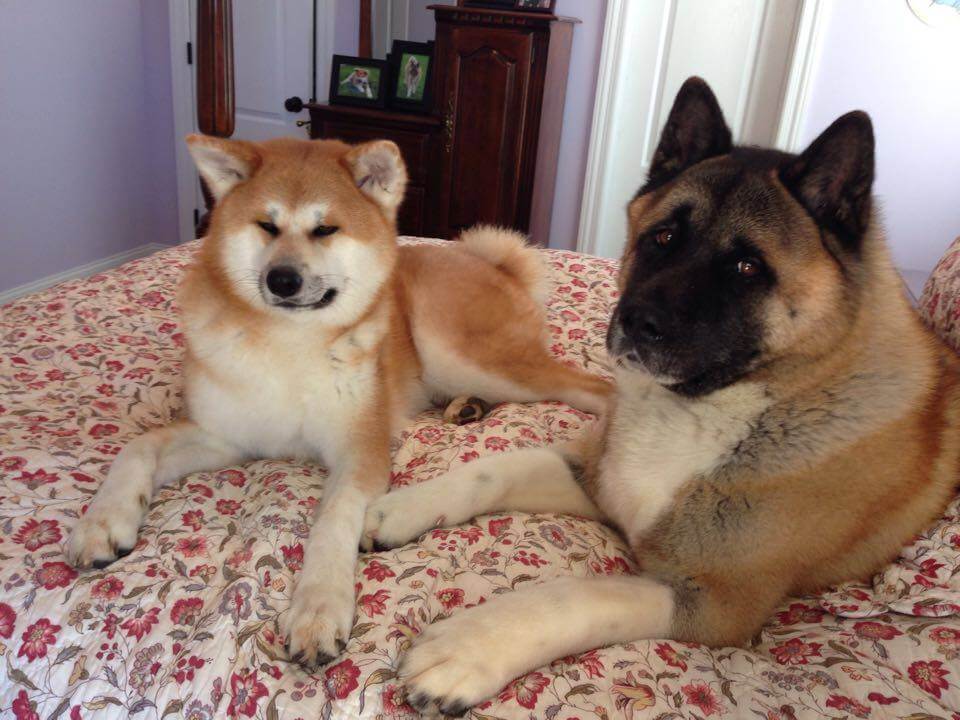How to Identify a Japanese Akitainu
Ever wonder if an Akita is a Japanese Akitainu or an American Akita? Outside of the United States and Canada, it is quite easy to figure out if you have a Japanese Akitainu or an American Akita.
The Akita is split into two distinct breeds worldwide – the Japanese Akitainu and the American Akita. Both breeds trace their roots back to Japan and both are considered pure Akitas. In some kennel clubs, the names for the two breeds are reversed depending on which breed was introduced in that country first. For example, despite having their own separate breed clubs, to this day uninformed British Akita owners often contact JACA on Facebook and insist that they have a Japanese Akitainu only to discover that, no, actually what they have is an American Akita. We suspect that this happens because of the variation in breed names. You see, in some nations, what most of the world refers to as the American Akita is called an Akita, and in other nations, they refer to a Japanese Akitainu as an Akita. To confuse matters even more, some people actually just call their Akitainu an inu which makes little sense to the country of origin because inu simply means dog, as in any dog, no matter what the breed. So when owners go around saying, “I have an inu,” Japanese speakers are thinking, “Yes, you have a dog. But so does that Shiba Inu owner over there.” And then everyone is even more confused. Hopefully, you’ll find the chart below a useful tool. It shows how registering bodies worldwide categorize their Akita breeds.
Kennel or Breed Club
Akitainu Hozonkai (AKIHO)
FCI (JKC, CKBC, LOI, etc.)
United Kennel Club (UKC in US and Canada)
The Kennel Club UK (KC)
American Kennel Club (AKC)
Canadian Kennel Club (CKC)
Japanese Akitainu is called…
Akitainu
Akita (or Akitainu in Japan)
Japanese Akitainu
Japanese Akita Inu
Japanese Akitainu
Japanese Akita
American Akita is called…
No American Akita in AKIHO
American Akita
Akita
Akita
Akita
Akita


The photo on the left is of Kenji, a male Japanese Akitainu and Sumi, a female American Akita. The photo above is of Nabi, a female Japanese Akita and Bearshi, a male American Akita. The sizes and facial features/colors are the most obvious differences between these four dogs of the two breeds.
In the United Kingdom, if your Royal KC pedigree says Japanese Akita Inu, then you know you have a Japanese Akita, but if you had an Akita before the UK split the breed in the early 2000s, your paperwork may have said Japanese Akita even though your dog was actually an American Akita. If you live in an FCI Country, the Japanese Akitainu is known as the Akita, but a few countries may list it as Akita Inu. Since 2013, the United Kennel Club (UKC) in the US has recognized the Japanese Akitainu (though it was initially called Japanese Akita). In 2020, the AKC admitted the Japanese Akitainu into its Foundation Stock Services as well. Regardless of where you live, if your Akitainu has an AKIHO pedigree, that is as legitimate as it gets.
What are the words to watch for when looking for a Japanese Akitainu?
The search for a new puppy can be a long and tedious task. When searching for a breeder with a reputable breeding program, you may find that the breeder wants an application followed by an interview. As the search continues, a prospective puppy buyer starts to develop the urge to settle. That is the moment when mistakes happen. When looking at advertisements, be aware of words and phrases that hint that the puppies are, in fact, American Akitas. Here is an example:
“Parents of the litter are Japanese-style (or Japanese-type) Akita Inu and their parents (grandparents) are 100% imported to the USA and/or are AKC Champions.”
The use of the word style or type followed by a statement that parents are 100% import and/or AKC Champions should raise a red flag especially since the JACA is still in the process of getting the Japanese Akitainu breed recognized in the AKC at the time of this writing (2024). In this case, the use of “and/or” is also a hint that these puppies may not be 100% purebred Japanese Akitainu. Focus on breeders who are willing to show you why their Akita are, in fact, Japanese Akitainu with either an AKIHO pedigree or with AKC FSS paperwork. Breeders are now able to have their foundation stock and litters recorded with AKC’s Foundation Stock Service.
So how do I figure out if an Akita is a Japanese Akitainu?
The most effective way is by looking at an official pedigree. Both AKC and UKC use the following criteria in determining purebred Japanese Akitainu:
(a) all ancestors in a three-generation pedigree are registered with the Japanese Kennel Club and/or Akitainu Hozonkai as a Japanese Akitainu or trace all their ancestry back to such dogs; or (b) all ancestors in a three-generation pedigree were registered as a Japanese Akitainu within a register created by an FCI Kennel Club since their recognition in October 1998 or the Royal Kennel Club (UK) since 2006; or (c) the dog has a three-generation pedigree which is a combination of the above, provided all eight great-grandparents are either as specified in (a) or (b).
Don’t be afraid to ask the breeder. In fact, make sure you ask these three questions during your search:
- “Do you believe in two breeds of Akita?” If the breeder isn’t pro-split, then their Akita could be blended.
- “Do you register your puppies and are they or can they be registered as Japanese Akitainu?” Akita that cannot be registered as Japanese Akitainu are a big red flag. Look for a dog with a registration from AKIHO, the UKC, AKC, JKC, KC (UK), CKC (Canada), or an FCI-affiliated Kennel Club. Avoid other registries.
- “Would you mind sending me a copy of the Sire and Dam’s pedigree?” You don’t need a copy of the official pedigree. Some breeders are hesitant to give official pedigrees. You just need to see if the puppy you are purchasing falls under the guidelines listed above. A sample pedigree or online database will work just fine. For now, we recommend you use the Akitainu Pedigree website.
If you are still confused, drop us an email. Send us a photo of your Akita and a copy of his/her pedigree to info@akita-inu.com and we will help you figure it out.
